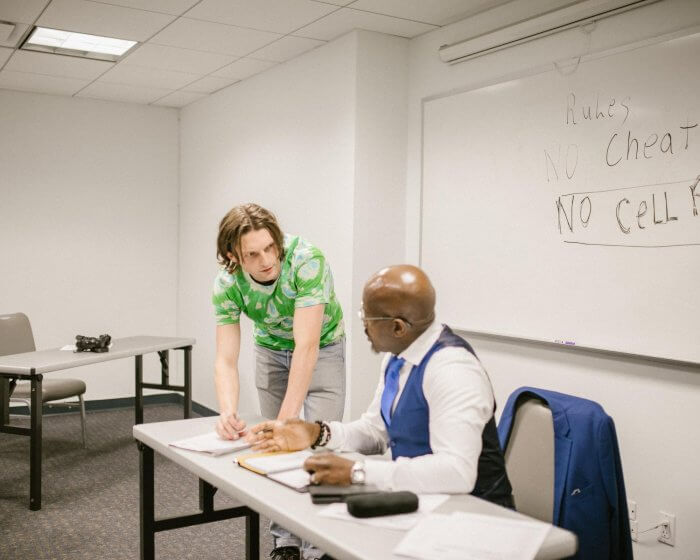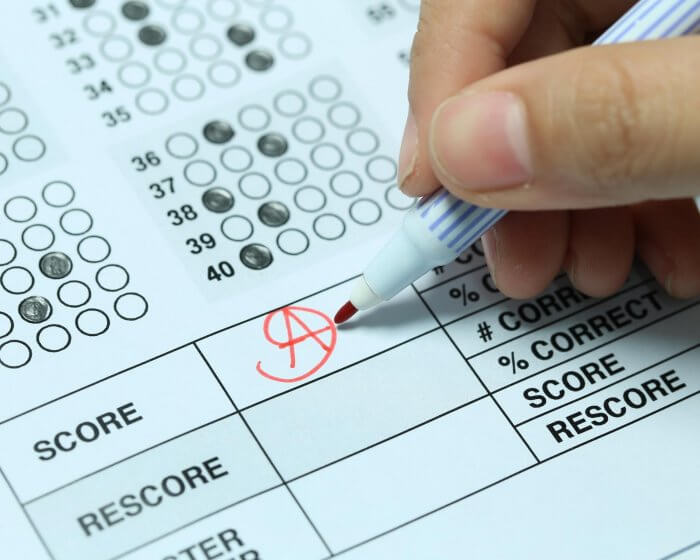Failing a college class is typically viewed as the worst thing that can happen to a student. The truth of the matter, however, is that failing a college class does not have to be one’s worst nightmare.
There are a number of reasons why it is bad to fail a class in college. One of the main reasons is that it can lead to feelings of inadequacy and shame. Additionally, failing a college class can have a negative impact on one’s academic record and future opportunities. Furthermore, it can be very costly to retake a class that you have failed.
While failing can be merely stressful for some students, especially those who are used to succeeding in everything they do, it can be utterly disastrous for others.
So what are you supposed to do when you’re failing a college class? Well, there is no one answer fits all. But we are here with some general tips that should help you.
So let’s say you are about to fail your college class. What should you do?
Continue Showing Up

It might seem like no one will notice if you don’t show up to class, but your college may give you a W for not coming to class. By showing up, you’re letting your professor know that you care about the material and want to do something about it.
Attendance is a big part of college, and going to class is the first step to passing. Some professors may even have a policy that if you don’t come to class, you can’t make up the work.
Plus, you may be able to get help from your professor if you let them know early on that you’re struggling. That way, you can sometimes get extra help and make sure you stay on track.
Ask Your Professor For Help

Student-professor communication is extremely important in academic institutions. Professors are here to provide assistance, not hold you back. So don’t be afraid of them.
In the beginning of the semester, professors typically give out a syllabus that includes the grading policy. If you are having difficulty understanding how your grade is being calculated, schedule an appointment during their office hours to ask.
Professors love students that proactively take the initiative to improve their grades, and often times are more likely to help you if they see that you are willing to put in the extra work.
If you are close to failing a college class, the best thing you can start with is talk to your professor. Many professors are more than willing to help students who are struggling, and they may be able to provide you with some advice or suggestions on how to improve your grade.
Your professor can also be a great resource for finding tutoring services if you need help with the material, which can be especially helpful if you are struggling in more than one course.
Look For Extra Credits

Most students don’t even bother asking for extra credit because they assume, it’s not worth the effort. This is especially true if the assignment is something that’s not relevant to the course material.
But, if you do some digging, you might be surprised at what you find. For example, doing an extra project that’s related to the course can help get you some easy points. So if you need the extra credit to pass the class, then be prepared for get busy. Think of it this way: If you want a higher grade, then your effort should reflect that.
In some cases, a professor might even offer extra credit for attending their office hours. So, if you’re struggling with the material, it might be a good idea to take advantage of this opportunity.
Just remember, if you’re going to ask for extra credit, make sure that the assignment is relevant to the course. And it should be something that you can do in a reasonable period of time. You don’t want to take on too much work, because that will only hurt your grade in the end.
Talk To Your Academic Advisor

This may seem obvious to most, but I have known students who have failed a class and didn’t tell their advisor they were failing. They thought they could talk the professor into letting them make up the work they missed. This is not wise because if you are already behind, you will probably continue to fall further behind.
Your academic advisor can help you come up with a plan to improve your grade and get you back on track.
The advisor can help with scheduling issues that may have contributed to your failure. Are your classes too heavy or are you working too many hours?
Your advisor can also help you find resources on campus, like tutoring and writing assistance, if you need them.
In some cases, your advisor can refer you to a counselor who may be able to help resolve personal issues that are impacting your school work.
If you are very close to failing, do not hesitate to reach out for help. It is better to get help now than to have to repeat a semester or worse, drop out of college.
Try To Hire A Tutor

A tutor can help you get back on track and pass your class. If you are failing, a tutor can help you figure out what areas of the class you need to concentrate on and which areas you’re already strong with. Your tutor can help you organize your time and study skills, and will monitor your progress.
Usually, you can find tutors through your college’s student services department. Campus tutoring services are often available for free or at a very low cost, and most colleges have a variety of subjects covered. If you’re not sure where to start, ask your professor or academic advisor for a recommendation. You can also ask your classmates if they know anyone who can help.
When looking for a tutor, be sure to ask about the tutor’s qualifications. Does the tutor have a degree in the subject you are studying? How about tutoring experience, or teaching experience? Also inquire as to his or her background before you agree to work with them.
Stay Positive Anyway

Yes, things may seem bleak and it may feel like everything is going wrong, but remember that you are not the only one who has gone through this. There are many people who have failed college classes, but they learned from their mistakes and eventually succeeded. The first step, though difficult, is to remain positive. It’s very important to keep your head up and continue to work hard.
A recent study conducted by experts in the field of education has shown that students who are positive about their college career have a higher chance of successfully completing their college courses.
The study carried out by experts from the University of Southern California found that students have a better chance of success if they maintain a positive attitude, regardless of the situation. The study also found that those students who were negative about their college career had a higher chance of dropping out of their college courses.
Dr. Paul R. Sackett, professor of psychology and co-author of the study said: “What we found is that a student’s expectations or attitudes about college — particularly in the early semesters — are very important in predicting their success or failure in college.”
According to the study, this is because students who are negative about their educational pursuits become demotivated and give up more easily.
So, if you are feeling down about your college career, it is important to stay positive and focus on the good things. This will really help you in achieving your goals and ensuring that you won’t fail your college class.
Remember, it’s not over until it’s over. You can still turn things around and pass your college class with flying colors. Just stay positive and don’t give up on yourself!
What Are The Consequences of Failing a Class In College?

First of all, if you fail a class in college, you will likely have to retake that class. This can add time and money to your college career.
You will need to check with your school to find out their specific rules for retaking a class. In some cases, if you fail a class more than once, you may be banned from enrolling in that particular class again.
GPA Will Likelly Suffer
Your GPA will take a hit if you fail a college class. The reason for this is because your GPA is calculated by averaging the grades you earn in all of your classes.
Grad school can be made or broken by your GPA. If you are trying to improve your chance of admittance, you may want to avoid taking any classes that could jeopardize it.
Your Academic Transcript Will Show The Failed Class
Your academic transcript will show that you failed a college class. This may be an issue when you are planning to apply to graduate school or for a job, because your grad school or new employers may require proof of academic excellence. An academic transcript is a detailed history of all the classes you have taken and the grades you received in each class.
To remedy this situation, you may want to retake the class. Your transcript will show that you passed the class with a higher grade (though some colleges combine your old grade with a new one).
If you are applying to graduate school, you should ask the school if they will accept a letter from your former professor with an explanation of why you failed the class.
You Can Loose Your Financial Aid
There are a few ways that you can lose your financial aid if you fail a college class. The most common way is by not passing the class with a passing grade. In this case, your financial aid can be cancelled and you may need to repay some or all of the funds that were given to you.
GPA is also a factor in determining whether or not you can keep your financial aid. If your GPA falls below a certain level, you may be at risk of aid cancellation. Some aid programs require you to pass your classes with a GPA requirement as well, and if you fail to do so, this may also affect your ability to keep the financial aid that you were given.
How many classes can you fail with financial aid?
There is no definitive answer, as it largely depends on the school and program you are enrolled in. However, it is generally recommended that you do not any classes if you want to keep your financial aid.
You Can Be Dismissed
In order to protect students and maintain the academic integrity of colleges and universities, many institutions have a policy that allows for the dismissal of a student who fails a course. This policy is often referred to as “academic probation.”
The purpose of academic probation is to provide an opportunity for a struggling student to improve his or her academic performance and restore satisfactory progress toward a degree. In addition, institutions may use probation as a way of assessing a student’s overall academic standing and warning the student of possible dismissal if future performance does not improve.
Conclusion
Failing a college class is never easy, but there are ways to mitigate the damage. The first step you should take if you’re about to fail your class is talk to your professor. It’s possible that they will offer extra credit opportunities or other resources for students who may need help in order to pass the course. If talking to your professor doesn’t work out, consider talking to your academic advisor.
If you’re struggling to find a way to improve your grades, it might be a good idea to hire a tutor. Tutors can help you with everything from test preparation to essay writing. Lastly, it’s important to stay positive. It might seem like everything is going wrong, but there’s always a way to turn things around. Fortunately, you have the power to do so.

